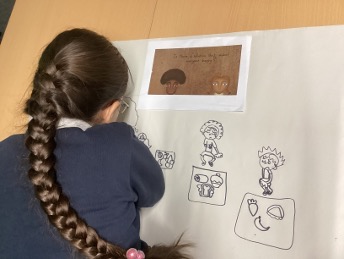Values & Ethos

Many of our pupils may have masked abilities in their former school setting or indeed since early childhood, as more complex social demands begin to exceed abilities or coping strategies. Our pupils may have developed an increasing recognition of difference in terms of their peers’ abilities, interests, and characteristic personalities. It is likely pupils may recognise qualitative differences between themselves and non-autistic peers which may contribute to secondary mental health difficulties associated with low self-esteem and anxiety.
Whilst the Windmill School offers a supportive, compassionate, and responsive environment we acknowledge the range of compensatory and adjustment strategies our pupils may have developed that may impact them negatively in terms of their sense of self.
A unique pedagogy for autism
All our pedagogy and teaching methodology offer opportunities for self-expression and self-exploration achieved through the curriculum and particularly through the arts such as music, poetry, writing fiction, drawing sculpture, textiles, and dance. We find our pupils will traverse into deeper and broader learning experiences following a period of learning they find energising where their abilities are embraced, and their passions appreciated.
Our Trust-Wide Vision
- To ensure that the quality of education for children and young people in all our provisions is of the highest standard, using only evidence-based research to drive school improvement so that we are at the forefront of progressive practice
- To celebrate diversity and difference by providing appropriate and relevant specialist curriculums that will meet the broad range of needs presented by the pupils in each provision
- To have regard to the health, safety and wellbeing of staff and students by providing safe, secure, stimulating and therapeutic environments for learning
- To be an outward looking organisation that maintains positive relationships across its professional networks; being committed to high quality governance and leadership in all settings to ensure effective financial performance
- To remain an independent specialist, SEND MAT, small enough to maintain a personalised service to the community of its academies and subsidiary provisions
Celebrate Uniqueness
Children and young people with a unique profile require the autism specific environment that the Windmill School will offer. The school was developed to engage and motivate all pupils by providing a curriculum that relates to them as individuals.
Central to our work is the concept that we want to avoid separation and exclusion and ensure inclusion is the core. Our key message is to not generalise teaching approaches but respond to the learning needs of each Windmill pupil as an individual.
Many of our young people like to ‘figure things out by themselves’ once equipped with knowledge of the world that is presented in a motivating and engaging way. We give high regard to the environment where all our pupils have control over their physical learning environment; this reduces social anxiety, therefore, enables access to learning. Our philosophy and ethos is important for the following reasons:
-
Autistic pupils need evidence-informed approaches including quality-first teaching and practice to remove barriers and allow them to learn effectively inside and outside the classroom.
-
Educating autistic pupils benefits from a whole-child approach, recognizing that attention to pupils’ mental health and emotional well-being is just as important as their autism.
-
Innovative and individualized methods of adapting the curriculum, utilizing pupils’ strengths and interests, are essential for ensuring that it is accessible, effective and engaging for pupils.
-
Close working relationships with parents, recognizing their key role, expertise and joint decision making, as well as their need for support, is essential for ensuring that learning continues outside the school.
-
Autistic pupils who are engaged in their learning, and who are active participants in decisions about their learning, are more likely to be confident learners in the short- term and the longer term.

